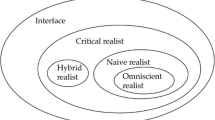Abstract
Functionalism, a philosophical theory, has empirical consequences. Functionalism predicts that where systematic transformations of sensory input occur and are followed by behavioral accommodation in which normal function of the organism is restored such that the causes and effects of the subject's psychological states return to those of the period prior to the transformation, there will be a return of qualia or subjective experiences to those present prior to the transform. A transformation of this type that has long been of philosophical interest is the possibility of an inverted spectrum. Hilary Putnam argues that the physical possibilty of acquired spectrum inversion refutes functionalism. I argue, however, that in the absence of empirical results no a priori arguments against functionalism, such as Putnam's, can be cogent. I sketch an experimental situation which would produce acquired spectrum inversion. The mere existence of qualia inversion would constitute no refutation of functionalism; only its persistence after behavioral accommodation to the inversion would properly count against functionalism. The cumulative empirical evidence from experiments on image inversion suggests that the results of actual spectrum inversion would confirm rather than refute functionalism.
Similar content being viewed by others
References
Block, N. J., and J. A. Fodor: 1972, ‘What Psychological States are Not’, Philosophical Review 81, 159–81.
Clark, Austen: 1985b, ‘Spectrum Inversion and the Color Solid’, Southern Journal of Philosophy 23, 431–43.
Clark, Austen: 1985a, ‘Qualia and the Psychophysiological Explanation of Color Perception’, Synthese 65, 377–405.
Ewert, P. N.: 1930, ‘A Study of the Effect of Inverted Retinal Stimulation upon Spatially Coordinated Behavior’, Genet Psych Monogr 7.
Festinger, V., C. A. Burnham, H. Ono, and D. Bamber: 1967, ‘Efference and the Conscious Experience of Perception’, Journal of Experimental Psychology, Monograph Supplement 74, number 637.
Gibson, J. J.: 1933, ‘Adaptation and After-Effect in Perception of Curved Lines’, Journal of Experimental Psychology 16, 1–31.
Gibson, J. J.: 1950, Perception of the Visual World, Houghton Mifflin, Boston.
Gibson, J. J.: 1966, The Senses Considered as Perceptual Systems, Houghton Mifflin, Boston.
Harris, C. S.: 1963, ‘Adaptation to Displaced Vision: Visual, Motor or Proprioceptive Change?’ Science 3, 71–72
Harris, C. S.: 1961, ‘Perceptual Adaptation to Inverted, Reversed and Displaced Vision’, Psychological Review 72, 419–44.
Harris, C. S. and A. R. Gibson: 1968, ‘Is Orientation-specific Color Adaptation in Human Vision due to Edge Detector, Afterimages, or “Dipoles”?”, Science 162, 1056–7.
Held, Richard: 1964, ‘Plasticity in Sensory-Motor Systems’, Scientific American 213, 84–94
Horgan, Terence: 1984, ‘Functionalism, Qualia, and the Inverted Spectrum’, Philosophy and Phenomenological Research 44, 453–69.
Kaufman, Lloyd: 1974, Sight and Mind, Oxford U. P., New York.
Kitcher, Patricia: 1982, ‘Two Versions of the Identity Theory’, Erkenntnis 17, 213–28.
Kohler, Ivo: 1964, The Formation and Transformation of the Perceptual World, trans. H. Fiss, International Universities Press, New York.
Kohler, Ivo: 1962, “Experiments with Goggles’, Scientific American, pp. 61–72.
Kripke, Saul: 1971, ‘Naming and Necessity’, in D. Davidson and G. Harman (eds.), Semantics of Natural Language, D. Reidel, Boston, pp. 253–355.
Lewis, David: 1980, “Mad Pain and Martian Pain’, in Block (ed.), Readings in the Philosophy of Psychology, Vol. I., pp. 216–22.
McCollough, C.: 1965a, ‘The Conditioning of Color Perception’, American Journal of Psychology 78, 362–68.
McCollough, C.: 1965b, ‘Color Adaptation of Edge-detectors in the Human Visual System’, Science 149, 1115–16.
Putnam, Hilary: 1981, Reason, Truth and History, Cambridge University Press, New York.
Rock, Irvin: 1966, The Nature of Visual Perception, Basic Books, New York.
Rock, Irvin: 1975, An Introduction to Perception, Macmillan, New York.
Shoemaker, Sydney: 1975, ‘Functionalism and Qualia’, Philosophical Studies 27, 291–315.
Shoemaker, Sydney: 1982, ‘The Inverted Spectrum’, Journal of Philosophy 79, 357–81.
Snyder, Fred. W. and N. H. Pronk: 1952, Vision with Spatial Inversion, University of Wichita Press.
Stratton, George M.: 1896, ‘Some Preliminary Experiments on Vision without Inversion of the Retinal Image’, Psychological Review, 3, 611–17.
Stratton, George M.: 1897, ‘Vision without Inversion of the Retinal Image’, Psychological Review 4, 341–60.
Stratton, George M.: 1909, ‘Correction of Rival Methods in Psychology’, Psychological Review 16.
Taylor, J. G.: 1962, The Behavioral Basis of Perception, Yale University Press.
Wallach, H., J. H. Kravitz, and J. Lindauer: 1963, ‘A Passive Condition for Rapid Adaptation to Displaced Visual Direction’, American Journal of Psychology 76, 568–78.
White, Stephen L.: 1986, ‘Curse of the Qualia’, Synthese 68, 333–68.
Author information
Authors and Affiliations
Rights and permissions
About this article
Cite this article
Cole, D. Functionalism and inverted spectra. Synthese 82, 207–222 (1990). https://doi.org/10.1007/BF00413662
Issue Date:
DOI: https://doi.org/10.1007/BF00413662




